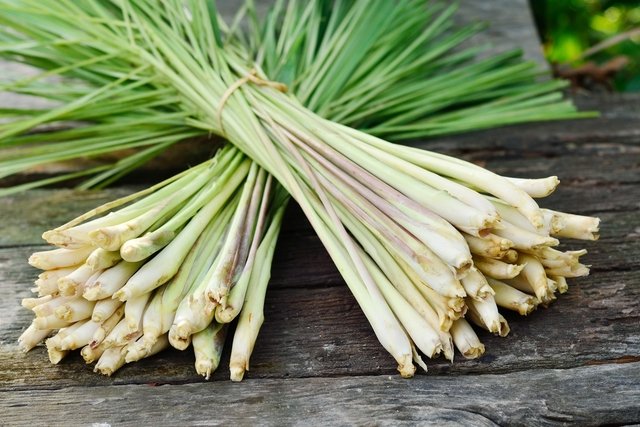Lemon grass is a medicinal plant that is rich in citral, limonene and geraniol. These are bioactive compounds with antioxidant action which work to fight excess free radicals. They can help prevent conditions like cancer, gastritis and high blood pressure.
In addition, lemon grass contains great quantities of myrcene, which is a bioactive compound with analgesic properties. It can help to relieve mild pain, like cramps, muscular soreness and headaches.
Lemon grass has a lemon-like aroma and can be found in fresh or dried forms at supermarkets. It can be used to prepare tea, dressings, juices, cakes or fruit jellies. Its essential oil is sold at natural health stores and can be used to heal wounds.

Health benefits
Because it is rich in flavonoids and phenolic compounds, lemon grass can be used for:
1. Weight loss
Because it contains diuretic properties, lemon grass promotes the elimination of accumulated fluid. This can help reduce abdominal bloating, making it an interesting option to include in a weight loss diet.
2. Gastritis treatment
Lemon grass can help with the treatment of gastritis, as it contains great quantities of flavonoids and tannins. These compounds contain antioxidant and anti-inflammatory action that neutralize and decrease stomach acid to help with the treatment of acid reflux and gastritis.
Lemon grass also has bactericide properties, which can make it beneficial as a compliment to the medical treatment of H. pylori. This bacteria lives in the stomach and can cause gastritis, peptic ulcers and even some types of cancer.
3. Pain relief
Because it contains myrcene and citral (which are bioactive compounds with analgesic properties), lemon grass can be used as a compliment to the treatment of headaches, muscular pain, stomach aches and rheumatism.
4. LDL cholesterol reduction
Lemon grass is rich in antioxidants, like limonene and geraniol, which help to fight free radicals and prevent fat cell oxygenation. This can help to reduce "bad" cholesterol or LDL levels as well as tryglyceride levels, and can prevent conditions like heart attack, stroke and atherosclerosis.
5. Blood pressure management
Because it contains diuretic properties, lemon grass promotes the elimination of excess sodium through the urine. This can aid in the management of blood pressure.
In addition, the antioxidant and anti-inflammatory compounds found in lemon grass (like citral, lemonene and geraniol) decrease inflammation and promote vasodilation. This improves circulation and can prevent high blood pressure.
6. Cancer prevention
Lemon grass is a medicinal plant that is rich in antioxidants, that help to strengthen the immune system and prevent the growth and development of cancerous cells.
7. Insomnia and anxiety management
Lemon grass contains compounds with sedative action (like cirtral), which act on the immune system to improve sleep quality.
Lemon grass contains soothing and relaxing action which can aid the treatment of stress and anxiety.
8. Wound healing
Lemon grass essential oil contains potent antimicrobial action and therefore can be applied directly to the skin to speed-up wound healing.
9. Yeast infection treatment
Lemon grass contains fungicide properties, which can help to combat Candida albicans, which is a type of fungus that is responsible for vaginal yeast infections and oral thrush.
In addition, lemon grass can help to aid the treatment of other types of fungal infections, like micosis and athlete’s foot.
10. Bad breath management
Because it contains bactericide and antiseptic properties, lemon grass can be used in preparations like teas and mouth gargles to combat bad breath caused by gingivitis and gum inflammation caused by bacteria between the teeth.
11. Insect repellant
Lemon grass can be used to keep bugs away, as its smell is irritating to flies and mosquitos.
How to use it
Lemon grass can be used to prepare teas and juices, or it can be used in wound dressings. Lemon grass essential oil can also be applied to the skin to treat wounds and yeast infections.
- Lemon grass dressings: Soak a piece of gauze or clean cloth in lemon grass tea and apply on the wound or irritated skin, Allow to sit for at least 15 minutes.
- Lemon grass essential oil: Mix 3 drops of essential oil in 1 tablespoon of vegetable oil (like coconut, jojoba or olive oil) and place on the wound or yeast infection. You should avoid sun exposure for at least 6 hours after applying this oil to prevent skin irritation.
Lemon grass essential oil can be used as a bug repellent or as a room fragrance. Just add 3 to 5 drops of essential oils in a diffuser.
Lemon grass can also be used in recipes for juices, cakes, fruit jelly and ice cream.
How to make lemon grass tea
Lemon grass is easy to make and can be consumed 3 to 4 times per day.
Ingredients
- 1 tablespoon of fresh leaves
- 1 cup of boiling water
How to prepare
Place the fresh leaves in a cup and cover with the boiling water. Cover, steep for 5 to 10 minutes, strain and drink.
Side effects
Lemon grass can cause dizziness, drowsiness, weakness, nausea, dry mouth and low blood pressure, which can lead to fainting.
Contraindications
Lemon grass is not recommended for pregnant or breastfeeding women. People who use relaxant medications or blood pressure medication should also speak to their doctor before taking lemon grass.
